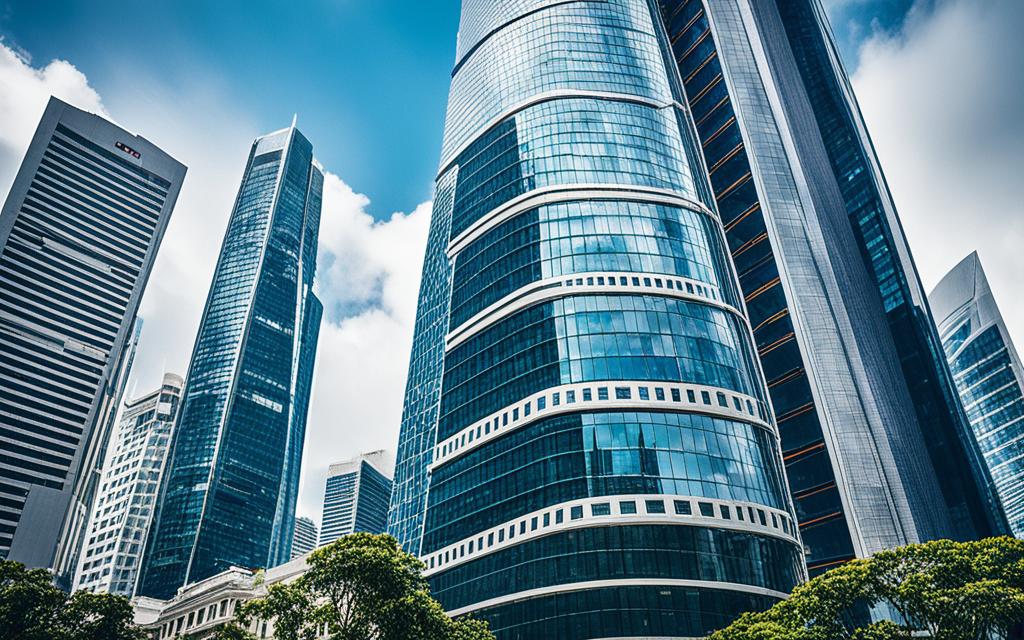
As we embark on a new year, the real estate market in Singapore is bustling with an air of positivity, largely influenced by an improved global economic outlook. Amid firming confidence levels, we observe a notable upsurge in commercial property investment in Singapore, specifically within seasoned asset classes such as hospitality, co-living, and logistical infrastructures. Additionally, the demand for Singapore office space rental continues to gain momentum, signaling a fortifying commercial sector.
Singapore commercial property prices are exhibiting resilience, partly due to the country’s robust political and economic environment, crafting a sanctuary for investors seeking stability and growth. Despite global challenges, the city-state’s commercial real estate scenario remains an epicenter for investment deals, attracting a broad spectrum of investors from the Southeast Asian region and beyond.
This article delves into the intricacies of Singapore’s commercial real estate landscape, uncovering the fertile grounds for investment that promise lucrative returns. Join us as we explore the dynamics that make Singapore a hub for commercial property investment and the strategies savvy investors are using to maximize their returns in 2024.
Singapore Commercial Property Prices: Investment Forecast for 2024
As we journey into 2024, the Singapore property market trends indicate a robust environment for investors eyeing commercial property for rent or purchase in this dynamic city-state. A detailed analysis of asset classes and economic influences offers insights into the promising landscape of Singapore’s commercial real estate.
An Overview of Asset Class Popularity: From Hospitality to Office Spaces
The diverse nature of Singapore’s commercial property sector highlights a range of asset classes that continue to attract attention. From the bustling hospitality sector, which caters to Singapore’s status as an international hub, to the burgeoning demand for office spaces that accommodate the city’s status as a business epicenter, investors are spoilt for choice:
- Hospitality venues capitalizing on Singapore’s tourism appeal
- Co-living spaces serving the needs of an agile workforce
- Logistics centers benefiting from Singapore’s strategic location
- Retail spaces that cater to a consumer base with a penchant for high-end shopping
- Office spaces that exemplify the innovation and growth of Singapore’s commercial landscape
The Impact of Economic Conditions on Investment Decisions
Investors remain cognizant of global economic factors, which play a significant role in shaping investment strategies. The Singapore property price index reveals that despite heightened financing rates affecting markets worldwide, Singapore’s commercial real estate sector remains resilient, with investors maintaining a cautious yet optimistic outlook:
- Global financing rates influencing loan strategies and investment timelines
- Economic fundamentals of Singapore instilling confidence among investors
- Political stability providing a trustworthy environment for significant capital allocation
Investment Deal Volume Anticipations: Trends and Projections
Projected deal volumes for the year reflect an uptick in activity, as both buyers and sellers adjust to the post-pandemic economic revival. This adjustment is evident in the optimistic yet cautious approach to the valuation of commercial properties:
- Realistic pricing expectations mirroring the delicate balance of a recovering economy
- A healthy trajectory signaled by renewed interest and demand for quality investment opportunities
- Institutional and non-institutional investors aligning their strategies with the current market pulse
The interplay between stable economic policies, keen investor interest in a variety of asset classes, and measured expectations set the Singapore commercial property market on a course for a favorable and prosperous 2024. Expansive opportunities await those ready to embark on the next chapter of Singapore’s commercial property narrative.

Why Non-Institutional Investors are Betting on Singapore’s Market Stability
Non-institutional investors have increasingly eyed Singapore as an investment haven, enticed by its enduring economic stability and minimal political risks. Unlike other market participants, these investors adopt a definitive ‘buy-and-hold’ approach, laying the groundwork for long-term capital appreciation. Singapore’s attractiveness for these investment strategies predominantly lies in its industrial and commercial property sectors, offering opportunities that promise sustainable growth amidst a turbulent global climate.

The appeal of industrial property Singapore markets lies in its strategic location in Asia, highly developed infrastructure, and a competitive workforce, making it an ideal hub for logistics and manufacturing businesses. This boosted Singapore to the vanguard for those looking to diversify their portfolios into commercial property investment Singapore.
- Low reliance on unstable financial mechanisms, such as excessive leverage or borrowing, reflecting a prudent investment stance.
- Persistent attraction to strata-titled properties, such as offices and shop houses, due to their manageable scale and potential for long-term capital appreciation.
- Resilience in investment commitment, with a well-informed outlook on current market conditions.
Despite recent global events that have slightly affected the investment climate, Singapore’s property market has sustained its allure. Non-institutional investors remain bullish about the city-state’s prospects, backed by substantive growth patterns and a market that rarely falters.
Navigating the Collective Sale Market: Opportunities Amidst Residential Challenges
Amidst the dynamic Singapore property market trends, the collective sale market is carving its own niche, offering a contrast to the residential sales sector and presenting unique investment openings. Highlighted by the recent activities surrounding landmarks like Delfi at Orchard and Concorde Hotel & Shopping Centre, the spotlight on Singapore commercial property prices gives investors a beacon of optimism. With pertinent differences from the residential collective sale market, commercial real estate in Singapore is proving to be resilient and potentially lucrative.
The Collective Sale Method: A Unique Aspect of Singapore’s Real Estate
The approach to collective sales in Singapore distinguishes itself from traditional real estate transactions. Here, multiple property owners collectively agree to sell their stakes, often leading to redevelopment prospects that unveil refreshing opportunities. Commercial properties have particularly benefited from this model, capitalizing on strategic locations and the city’s commercial vibrancy.
Commercial versus Residential Collective Sales: Analyzing the Divide
Recent trends in the residential collective sale market have laid bare a pricing conundrum, spurred by escalating costs and regulatory adjustments. In sharp contrast, the commercial real estate Singapore market has witnessed a smoother journey. Commercial owners are currently enjoying a favorable climate with less of a rift between expectations and realizable sales prices, largely as a result of several factors:
- Steady confidence in long-term business growth in prime locales
- Strategic redevelopment potential that aligns with government visions
- Increasing foreign investor interest in Singapore’s stable economy
How Government Land Sales Reflect the Market Dynamics
Government land sales (GLS) serve as a barometer for Singapore’s commercial property market, with the outcomes of these sales providing insight into market demand and price levels. The commercial sector’s positive performance in these land sales underscores the sector’s vitality and aligns with broader Singapore property market trends. The success of GLS, especially for prime commercial spots, sends a clear message about the sector’s robustness and continued potential for growth.

Investor interest in commercial real estate continues to be piqued by the evolving landscape and the successive accomplishments within the collective sales market. As Singapore navigates the challenges within the residential sector, the commercial property market, highlighted by strategic collective sales, showcases a distinctive pathway to investment opportunities that stand resilient in the face of economic fluctuation
The Revitalization of Singapore’s Office and Retail Spaces in 2024
In the vibrant heart of Singapore, 2024 has brought a noticeable resurgence within the office and retail sectors. Encouraging signs are evident as leasing activity gains momentum and pedestrian traffic intensifies amid the hustle of commerce. Even with a substantial volume of new office spaces entering the market, singapore office space rental prices remain resilient, reflecting sustained investor confidence and interest in premium locations. This buoyancy is not confined to office spaces alone; the retail domain is also experiencing a renaissance, particularly in prime retail spaces in Singapore, where empty stores are quickly becoming a rare sight.
The retail revival on iconic thoroughfares like Orchard Road correlates with a tangible uplift in consumer expenditure. Shoppers are increasingly embracing the tactile allure of in-person retail experiences, pivoting away from the erstwhile necessity of online shopping. This shift is underpinned by a projection that rental rates in these prime areas are poised for outperformance, a sentiment that galvanizes the investment landscape. A notable interplay between robust consumer spending and a gradual return to pre-pandemic shopping norms is nurturing an environment conducive for both retail tenants and potential investors.
Analyzing the broader picture, it’s clear that these trends are crafting a tapestry of opportunity for commercial property for rent Singapore. The commercial real estate sphere is abuzz with activity, suggesting a vibrant year for stakeholders. For investors seeking growth potential and for businesses in search of prime commercial spots, the climate is ripe with possibilities. As Singapore commercial property prices adjust to the demands of a recovering economy, the office and retail markets stand out as bright spots, offering enviable yields and investment appeal within Singapore’s dynamic property landscape in 2024.

